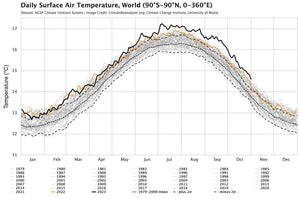Earlier this year, NOAA predicted 2023 would be one of the top ten warmest years ever recorded (their temperature records go back 174 years). But after September became the fourth month in a row with record setting high temperatures, they now believe there is more than a 99% chance this will become the hottest year ever.
Most climate experts did not predict this degree of extreme heat at the outset of 2023. The sudden jump in temperatures emphasizes the unpredictable nature of climate change: unforeseen changes and consequences are to be expected.
Researchers are looking for other unexpected explanations. A new study in the journal Nature Climate Change pointed to the reduction in aerosol emissions as actually contributing to rising temperatures. Primarily released by burning fossil fuels, aerosols pollute the air but they also reflect sunlight back out of our atmosphere, resulting in a cooling effect. As we work to reduce global fossil fuel emissions, the reduction in aerosols can actually contribute to warming temperatures.
The temperatures are expected to remain abnormally high through 2024.

